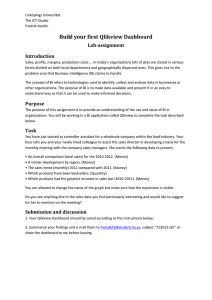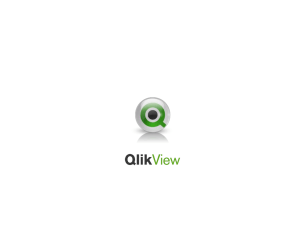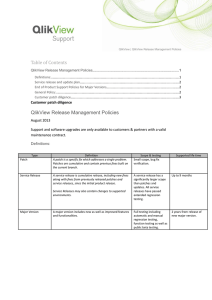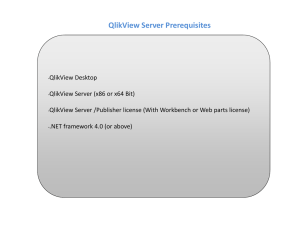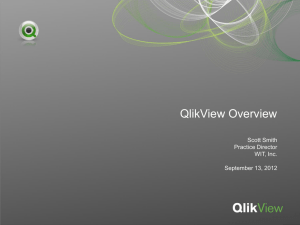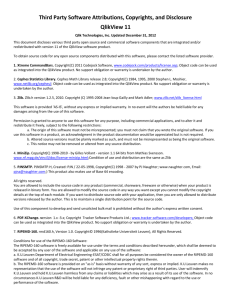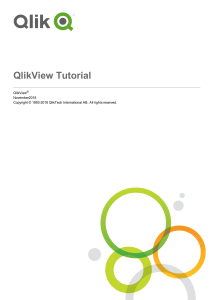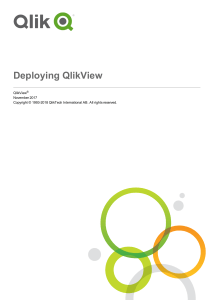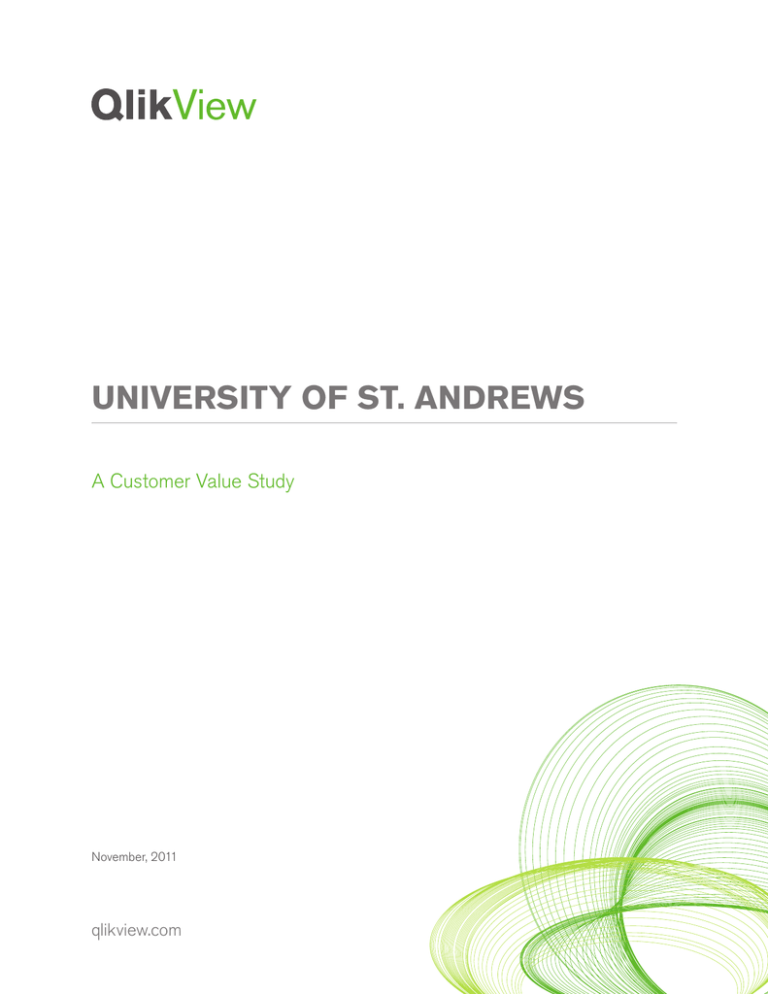
UNIVERSITY OF ST. ANDREWS
A Customer Value Study
November, 2011
qlikview.com
Table of Contents
Introduction
3
QlikView applications
4
Executive Summary of QlikView’s value to the University
5
In depth overview of QlikView applications 6
End Notes
12
QlikView on Mobile: Beyond Reporting | Page 2
Introduction
In 2009, the University conducted an Administrative Systems Review project that identified
a number of issues regarding the quality and structure of its data at source. In order to
source and collate the accurate and reliable data required to drive business decisions
and meet the requirements of statutory returns, the need was identified to invest in the
University’s business systems and purchase an effective business intelligence tool. The
subsequent tender process identified QlikView as the most suitable tool because it was
considered to be fast, user-friendly, quick to develop, quick to learn, able to connect diverse
existing data sources and had the capacity to enable the University to do what it needed to
do. Other perceived strengths were its very flexible security and site licensing models and
the fact that it was already being used by some other institutions in the higher
education sector.
Implementation was achieved at the University in 2010 utilising just ten days of QlickIT’s
Consulting Services which was deemed to represent very good value. Since then, a number
of applications have been developed for use across the University and several more are in
different stages of planning and development. A summary of which QlikView applications
are already in use or in development follows.
Customer Value Study | University of St.Andrews | Page 3
QlikView Applications
REGISTRY
Registry is the main central administrative department, providing services in the areas of:
Student records, curriculum management, examinations and timetabling, and statistical
reporting. Two QlikView applications are currently in use by Registry: Approved Student
Numbers (ASN), and Student HESA Return Helper.
Other QlikView Registry applications are also in development: National Student Survey
(NSS), iGrad, HESA Analysis, Paperless Admissions.
STUDENT RECRUITMENT & ADMISSIONS
Student Recruitment & Admissions is the department responsible for co-ordination all
Undergraduate and Postgraduate applications to the University. A Geographic Mapping
application has been developed to illustrate the geographic location of student applications.
HUMAN RESOURCES
HR supports the University through the development and delivery of people management
strategies and a range of professional support, information and advice services consistent
with employment legislation and best practice. Two QlikView applications are currently in
use by HR: Staff Directory and the Casual Staff best practice, Work Force Planning.
FINANCE
The Finance Department is responsible for the production of the University’s financial and
management accounts, and for the administration of its financial processes. Four QlikView
applications are currently in use by Finance: Grant Analysis, Research Grant Spend Analysis,
Budget Monitoring, and Finance Customers.
Other QlikView Finance applications are also in development: Expenses Reporting, Month
End Process. Cyclops Integration.
ESTATES
Estates are responsible for the management and maintenance of the University estate
facilities. A Management Reporting application has been developed to help inform the
department’s business planning.
OTHER FUNCTIONS
No other QlikView applications are yet in use by other administrative functions. However,
in addition to the 12 applications in development referred to above, another nine are in
development across other areas including the Principal’s Office.
One academic School, Computer Science, has also developed its own applications.
.
Customer Value Study | University of St.Andrews | Page 4
Executive Summary of QlikView’s Value to the University
Figure 1. Finance Reporting.
© 2011 QlikTech
The process of developing and implementing QlikView at the University of St Andrews
started only relatively recently in 2012. However, QlikView applications have already enabled
the institution to achieve efficiencies and enhancements in the provision of its diverse
management and administrative services. Progress has been most notable within the areas
of HR and Finance where connectivity between their respective data sources has been
achieved to mutual benefit. QlikView is now considered to be integral to the University’s
strategic plan because of its capacity to join up diverse data sources and to provide greater
confidence in the data by exposing issues at source. Financial savings are also being made
by consolidating on one reporting system and now renewing other licences (for example,
£4k per year has recently been saved on one small Cognos licence alone).
It is expected that more benefits to the University of QlikView implementation will become
apparent in 12-18 months’ time. By that stage, more applications will have been developed
and implemented across the institution and the existing applications will have become
intrinsic parts of the University’s management and administrative functions.
Customer Value Study | University of St.Andrews | Page 5
In Depth Overview of QlikView Applications
REGISTRY
Figure 2. RFO Academics Dashboard.
© 2011 QlikTech
The responsibility for maintaining an accurate and up to date register of all current
and enrolling students represents a significant challenge for the University’s Registry.
The expansion of student numbers in recent years has been matched by growth and
diversification of study programmes, study modules, levels of entry, modes of study and
sources of student applications. The QlikView applications developed for Registry are still
in the early stages of implementation but they are already helping to generate accurate and
reliable reports for the critical purposes of strategic planning and statutory returns.
The University’s student population data changes on a daily basis. The Approved Student
Numbers (ASN) application has enabled staff to obtain an accurate record of the student
population at a given point in time by pulling together data from different sources. It was
previously necessary to compile such reports manually which proved time-consuming and
subject to data inconsistency and error. The application has proved beneficial in exposing
such data issues and enabling Registry to plan measures to control them. In making
the student population data readily accessible and accurate, the application enables the
University to make comparisons, identify trends and areas of risk, and ultimately to plan its
strategic development.
Customer Value Study | University of St.Andrews | Page 6
It also enables the University to compile reports for numerous statutory returns including
the Higher Education Statistics Agency (HESA) annual return. Such returns are mandatory
requirements that must be fulfilled by the University in a timely and accurate manner to
ensure that it complies with its statutory requirements and also receives the appropriate
levels of public funding. Government policy dictates, for example, the level of funding
awarded for enrolling students from non-traditional backgrounds (widening participation).
The ASN and HESA Return Helper applications help to ensure that all submitted returns
include accurate and up to date data. They have saved significant staff time in Registry that
would previously have been spent compiling data manually from different sources. That time
can now be invested in fulfilling Registry’s numerous other services to the University staff
and student population.
It is also expected that other QlikView applications currently in early stages of development
for Registry will enable it to provide an enhanced service to students and their academic
departments through the creation of complete individual student records and curriculum
pathway models.
Student Recruitment & Admissions
The Geographic Mapping application has recently enabled the University to visualise the
geographic location of all of its Undergraduate and Postgraduate student applications.
The main advantages of this tool are the convenience, ease of use and speed at which
this information is now made available to staff involved in student recruitment. They have
confidence that the data presented is accurate and up to date. It is proving beneficial in
informing the planning and targeting of future recruitment campaigns, schools visits, fairs,
liaison activities etc. Differences and trends in year-on-year applications will be easier to
identify, monitor and respond to. As a result, it will be possible to target the financial and
human resources associated with student recruitment more closely and effectively, thus
providing the University with a competitive advantage and, it is anticipated, with increased
returns on its investment in student recruitment activity. The outcome of this will not be
evident until the end of the current recruiting cycle for October 2012 entry.
RESEARCH FUNDING OFFICE
For reasons associated with the UK economic downturn and reductions in the public
funding of research (e.g. 50% cut in Equipment funding), there has been a recent decrease
in the value of the University’s research grant awards. To help address this external threat,
the QlikView Grant Analysis application has been developed to provide staff with a definitive
view of the University’s research bids and their outcomes. The main advantages of this tool
are its ease of use and speed at which reports can now be created (“Now we can do reports
in minutes that would have taken days before”). The University-wide transparency of the
reports is also considered to be a key advantage.
Customer Value Study | University of St.Andrews | Page 7
Figure 3. RFO Individual Grant Analysis.
© 2011 QlikTech
The application is mainly used to record all interactions with sources of research funding,
to identify the core and growing funders, to identify changes and trends, and to identify
research income generation by specific members of academic staff. The Research Funding
Office, Directors of Research and Heads of School now have visibility of the quantity and
quality of research applications across the University and are able to see which ones have
been successful in receiving funding and from which sources. This insight is already helping
to inform the University’s Research Strategy as it is now much easier to identify bodies
that represent stronger, new or growing opportunities for funding, including non-public and
international sources.
The main benefit to date has been the amount of staff time saved in the Research Funding
Office and in the Schools generating and analysing research bids and their outcomes.
Looking forward, however, it is expected that the QlikView Grant Analysis application will
enable the University to generate increased levels of research income through the informed
development of its Research Strategy.
The Research Grant Spend Analysis application has also been developed to enable the
Research Funding Office, Directors of Research and Heads of School to monitor effectively
all expenditure against research income allocations. User-friendly access to this accurate
and up to date financial data now enables staff to maximise the usage and benefit of
research income streams by minimising the risk of over-spending or under-spending against
them. Previously, overspends would have had to have been covered by the University from
other areas whilst any underspends would have had to have been given up at the end of
specified funding periods.
Customer Value Study | University of St.Andrews | Page 8
MANAGEMENT ACCOUNTS
The Budget Monitoring application has helped Management Accounts to save staff time
and provide a more efficient, improved service to the University. The main advantages of this
tool are its ease of use and its functionality in pulling together data from different sources.
It has replaced the previously time-intensive method of compiling reports from different
sources manually. It also has the benefit of of reporting ‘live’, rather than historic, budget
data. Connectivity between the Finance and HR data sources also enables Management
Accounts staff to drill down and compile budget reports according to individual members or
teams of staff.
The main benefit to date has been the amount of staff time saved in Management Accounts
compiling accurate budgetary reports. They are now are able to provide a quicker and
more reliable service to the academic and administrative departments. Looking forward,
however, it is expected that the enhanced nature of the reports, the new levels of detail, and
the speed at which they can now be provided, will enable the University to identify risks in
current expenditure practice and to plan measures to manage them more effectively.
HUMAN RESOURCES
Figure 4. RFO Staff Dashboard.
© 2011 QlikTech
The Staff Directory application has enabled Human Resources to make the University’s
personnel data more visible and subsequently to ensure that it is accurate and up to date.
The main advantages of this tool are its ease of use and functionality in pulling together
Customer Value Study | University of St.Andrews | Page 9
data from different sources. By drilling down, filtering and slicing data, staff in HR and
across the University are able to access user-friendly information regarding the staffing
establishment of the University’s academic and administrative functions. Connectivity
between the Finance and HR Payroll data sources also means that the total costs
associated with individual and team staff establishments can now be reported on and
analysed reliably and quickly. This has enabled HR to provide enhanced levels of timely and
reliable guidance to departments regarding their workforce planning, succession planning
and staff recruitment.
The main benefit to date has been the ease and speed at which staff data analysis can now
be conducted. Staff like the speed and filter selection bookmarking functionality (“it beats
Oracle hands down!”) It has saved time in HR, enabling staff to provide a quicker and more
reliable service and to dedicate more time to other HR services. Looking forward, however,
it is expected that the enhanced nature of the reports, and the speed at which they can now
be provided, will enable the University to identify trends and risks in staffing establishments,
succession planning and recruitment, and to plan measures to manage them
more effectively.
ESTATES
The Management Reporting application has been implemented very recently to enable
Estates to enhance its business planning with full, accurate and up to date data. The new
application replaces two previously separate data systems and has already provided the
benefit of highlighting certain existing data issues. It has been developed to report faults
and incidents across the University’s estate comprehensively. Staff will use the application
to identify patterns of faults and identify probable problem areas. It is expected that this
will enable more effective business planning and help Estates to develop from providing a
mainly reactive service to a proactive one. For example, staff will be able to use the data
to inform decisions about staffing levels and the contracting of external services around
certain faults and specific times of the year. It is expected that this will drive efficiencies
to be reinvested more productively elsewhere across the estate. New build planning will
also take account of the information to avoid the identified faults from occurring in the first
place. The connectivity of Estates project data with financial data will provide staff with ‘live’
visibility of what is being spent against specific projects to allow closer budget monitoring.
Overall, the application is expected to play a central role in enabling Estates to meet its
strategic objective of providing an improved service to the University that is demonstrably
more efficient and proactive.
Customer Value Study | University of St.Andrews | Page 10
SCHOOL OF COMPUTER SCIENCE
One academic department, the School of Computer Science, has developed its own
QlikView applications to help maximise student recruitment to the School and save time in
generating the various reports it requires. The main benefit to date has been the ease and
speed at which information can now be accessed. Staff in the School can now generate
reports according to their specific requirements without having to go to HR, Finance,
Registry etc. for the information. This is saving a lot of staff time both within the School and
in those administrative areas.
The School is also using QlikView to improve the rate of conversion from the offer of a
study place to enrolment. The visibility of prospective student records allows staff to contact
individuals personally and to engage them in a dialogue and process of conversion with the
School. This gives the School a competitive advantage in being able to manage its student
intake according to its targets.
Staff in the School of Computer Science are particularly impressed by the QlikView
application’s speed, user visibility and flexibility with data.
© 2011 QlikTech International AB. All rights reserved. QlikTech, QlikView, Qlik, Q, Simplifying Analysis for Everyone, Power of Simplicity, New Rules, The Uncontrollable Smile and
other QlikTech products and services as well as their respective logos are trademarks or registered trademarks of QlikTech International AB. All other company names, products
and services used herein are trademarks or registered trademarks of their respective owners. The information published herein is subject to change without notice. This publication
is for informational purposes only, without representation or warranty of any kind, and QlikTech shall not be liable for errors or omissions with respect to this publication. The only
warranties for QlikTech products and services are those that are set forth in the express warranty statements accompanying such products and services, if any. Nothing herein should
be construed as constituting any additional warranty.
Customer Value Study | University of St.Andrews | Page 11
End Notes
1
QlikTech came out as a Leader in this study. For more information, see the January 27, 2011 Gartner report,
“Magic Quadrant for Business Intelligence Platforms.”
2
According to Gartner, data discovery software will be a $1 billion market in its own right as soon as 2013. See
the June, 2011 Gartner report, “Emerging Technology Analysis: Visualization-Based Data Discovery.”
3
“Predicts 2011: New Relationships Will Change BI”, Gartner Research, November 25th, 2010
© 2011 QlikTech International AB. All rights reserved. QlikTech, QlikView, Qlik, Q, Simplifying Analysis for Everyone, Power of Simplicity, New Rules, The Uncontrollable Smile and
other QlikTech products and services as well as their respective logos are trademarks or registered trademarks of QlikTech International AB. All other company names, products
and services used herein are trademarks or registered trademarks of their respective owners. The information published herein is subject to change without notice. This publication
is for informational purposes only, without representation or warranty of any kind, and QlikTech shall not be liable for errors or omissions with respect to this publication. The only
warranties for QlikTech products and services are those that are set forth in the express warranty statements accompanying such products and services, if any. Nothing herein should
be construed as constituting any additional warranty.
Customer Value Study | University of St.Andrews | Page 12

